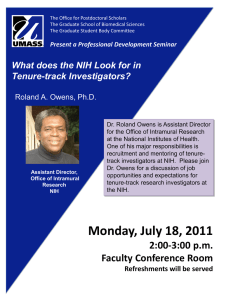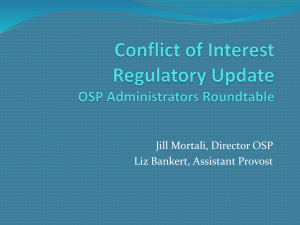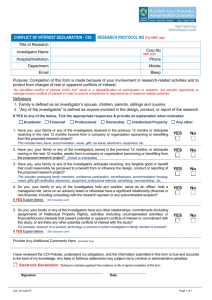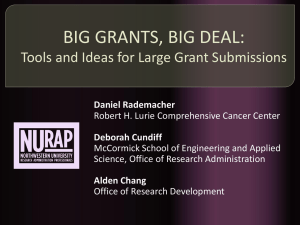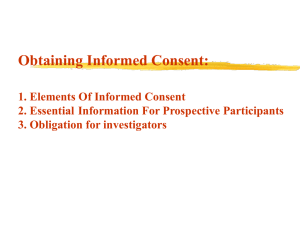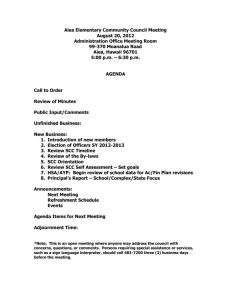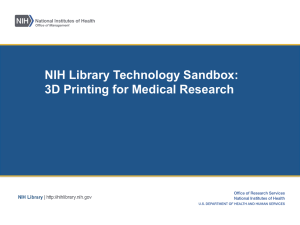2015 Pilot Projects in Collaborative Cancer Disparities Research
advertisement
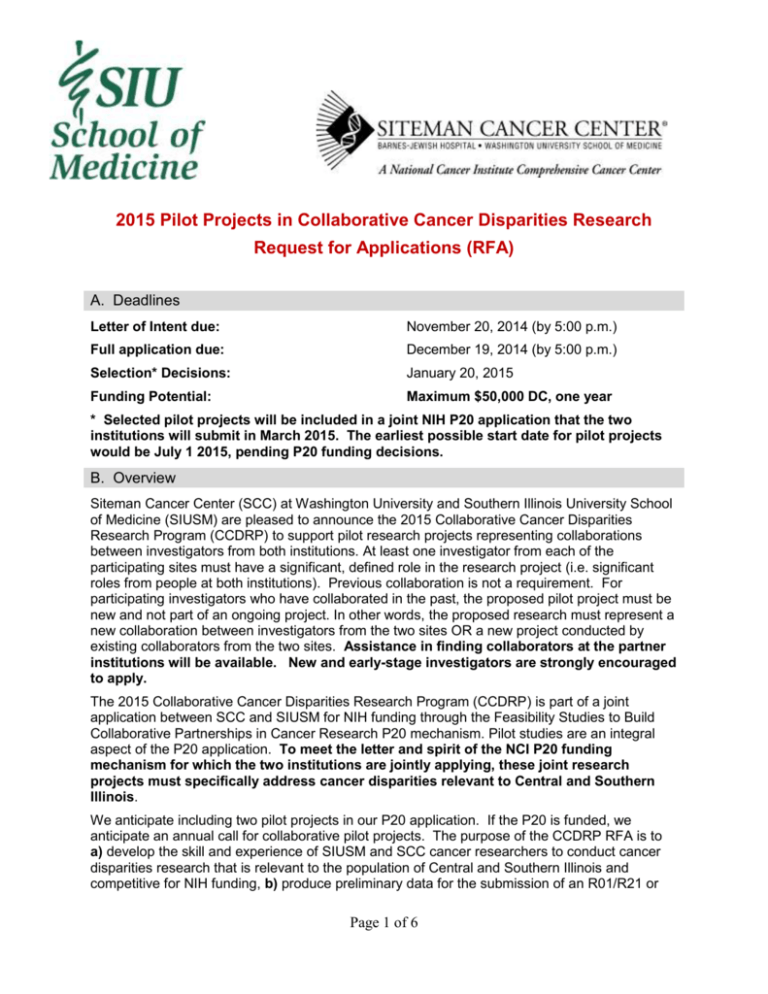
2015 Pilot Projects in Collaborative Cancer Disparities Research Request for Applications (RFA) A. Deadlines Letter of Intent due: November 20, 2014 (by 5:00 p.m.) Full application due: December 19, 2014 (by 5:00 p.m.) Selection* Decisions: January 20, 2015 Funding Potential: Maximum $50,000 DC, one year * Selected pilot projects will be included in a joint NIH P20 application that the two institutions will submit in March 2015. The earliest possible start date for pilot projects would be July 1 2015, pending P20 funding decisions. B. Overview Siteman Cancer Center (SCC) at Washington University and Southern Illinois University School of Medicine (SIUSM) are pleased to announce the 2015 Collaborative Cancer Disparities Research Program (CCDRP) to support pilot research projects representing collaborations between investigators from both institutions. At least one investigator from each of the participating sites must have a significant, defined role in the research project (i.e. significant roles from people at both institutions). Previous collaboration is not a requirement. For participating investigators who have collaborated in the past, the proposed pilot project must be new and not part of an ongoing project. In other words, the proposed research must represent a new collaboration between investigators from the two sites OR a new project conducted by existing collaborators from the two sites. Assistance in finding collaborators at the partner institutions will be available. New and early-stage investigators are strongly encouraged to apply. The 2015 Collaborative Cancer Disparities Research Program (CCDRP) is part of a joint application between SCC and SIUSM for NIH funding through the Feasibility Studies to Build Collaborative Partnerships in Cancer Research P20 mechanism. Pilot studies are an integral aspect of the P20 application. To meet the letter and spirit of the NCI P20 funding mechanism for which the two institutions are jointly applying, these joint research projects must specifically address cancer disparities relevant to Central and Southern Illinois. We anticipate including two pilot projects in our P20 application. If the P20 is funded, we anticipate an annual call for collaborative pilot projects. The purpose of the CCDRP RFA is to a) develop the skill and experience of SIUSM and SCC cancer researchers to conduct cancer disparities research that is relevant to the population of Central and Southern Illinois and competitive for NIH funding, b) produce preliminary data for the submission of an R01/R21 or Page 1 of 6 2015 Pilot Projects in Collaborative Cancer Disparities Research Request for Applications (P4 RFA) similar proposal, and c) develop new and long-term collaborative relationships between SCC and SIUSM. BACKGROUND There are two definitions important for this CCDRP RFA. Cancer disparities is defined by the NCI as “an adverse difference in cancer incidence (new cases), cancer prevalence (all existing cases), cancer death (mortality), cancer survivorship, and burden of cancer or related health conditions that exist among specific population groups in the United States”. Population-based research is defined as “methods seeking to define optimal approaches to the prevention and treatment of cancer, and disseminate these interventions to populations at large”. CCDRP applications that include the following three major ideas within populationbased research are encouraged. 1. reducing and understanding cancer disparities, 2. identifying cancer risk and protective factors, and 3. developing or examining interventions which decrease risk or increase protective factors and can later be implemented at a population level. The following areas of research will be considered eligible for pilot funding in this round of applications. Within each of these areas, investigators should address the relevance of their research to cancer disparities in Central and Southern Illinois. Population-based research: Proposals of this type must explicitly examine cancer/cancer disparities from a population-based perspective. These projects can include secondary analysis of population data sets, engagement of communities in data generation or intervention, or collection of data from a defined population (e.g., cancer patients, residents of rural Illinois, etc.). These projects can use either quantitative or qualitative research methods, a range of study designs and be conducted in clinical or community settings. Basic science research: Proposals from basic science (pre-clinical) must describe the potential to eventually impact clinical practice or human health. This may include studies that primarily use human specimens (tissue, blood, etc.) or animal models. Clinical/translational research: Proposals of this type must explicitly involve patients or human specimens and examine methods to prevent, diagnose, treat and/or otherwise mitigate cancer in the clinical setting. C. Eligibility Each application must include at least one SIUSM and at least one SCC investigator/mentor. SCC applicants must be Cancer Center members. Multiple Principal Investigator (M-PI) applications are acceptable but not required. D. Amount Page 2 of 6 2015 Pilot Projects in Collaborative Cancer Disparities Research Request for Applications (P4 RFA) Selected projects will be awarded a maximum of $50,000 (direct cost) for one year/nonrenewable. Indirect costs are not allowed. Funding is dependent on P20 funding from the NIH for the SCC/SIUSM Partnership application. Expenditures Allowed Salary support for the applicant as needed Research supplies and animal maintenance (including animal per diem charges) Per diem charges for patients, for clinical study components not reimbursable by standard payment terms Technical assistance Publication costs, including reprints, study instruments, surveys, etc. Computational services Other expenses such as lab and core fees; e.g. pathology, imaging, etc. Regional travel required for the conduct of the study (e.g. between collaborating institutions) Expenditures NOT Allowed Secretarial/administrative personnel salary support Office equipment and supplies Equipment Computer/equipment maintenance fees Tuition Indirect institutional costs Nonessential travel (e.g. travel to conferences) E. Submission Guidelines Overview: This small grant program will support discrete, well-defined projects that realistically can be completed within one year and within the limited levels of funding outlined above. Pilot or feasibility studies and small, self-contained research projects are allowed. Pilots should be developed to move investigators toward a subsequent successful external grant submission. Pilot funding is dependent upon a successful SCC/SIUSM P20 application to NIH. Each application must be submitted by a team that includes at least one SCC investigator and at least one SIUSM investigator. Each application may request up to $50,000 in total costs (no indirect costs permitted) for research efforts to be conducted over a one (1) year period. Applications will be scored by a Multi-Institutional Scientific Review Group. Pilots will be selected based on scientific merit, and relevance and fit with the P20 programmatic goals. Pilot applications do not have to be routed through WU or SIUSM Grants & Contracts Office at this stage. The earliest possible start date for pilot projects is July 1, 2015. Monies will not be transferred from one institution to another. Additional budgetary restrictions may apply, as determined by policies and procedures at the participating institutions. Applications from NIH-defined new investigators or from investigators who are junior or are transitioning to cancer research are strongly encouraged. In these cases, an experienced senior investigator (mentor) from one of the institutions must be clearly identified and a Career Page 3 of 6 2015 Pilot Projects in Collaborative Cancer Disparities Research Request for Applications (P4 RFA) Development Plan must be included. For the definition of a “new investigator, please visit the NIH website (http://grants.nih.gov/grants/new_investigators/index.htm). Specific Instructions Step 1: Letter of Intent (LOI): To prepare for adequate numbers and expertise of reviewers, each investigative team planning to submit an application, must submit a letter of intent (LOI). LOIs are due to Project Manager, Ms. Carolyn Stoll (stollc@wudosis.wustl.edu) no later than 5:00 pm Central Time on November 20, 2014. The LOI should be no longer than one (1) page and include a title, investigator names/ institution/expertise/contact information s, a clear description of the project’s cancer disparity relevance, and a very brief outline of the proposed research plan. Step 2: Full application: Each application should adhere to the guidelines below and generally follow NCI format (Arial 11 or Times New Roman 12 point font (9 point or larger in tables, figures, legends, etc.), ½ inch margins, one-sided, numbered pages, etc.). Resubmissions from our previous round of applications are allowed but must include a one-page Introduction that addresses reviewers’ critiques. Applications must be received electronically by 5:00 pm CST, on December 19, 2014. Email applications to the Project Manager, Ms. Carolyn Stoll (stollc@wudosis.wustl.edu). A. Specific Aims: The specific aims section should include a clear description regarding how the research is of concern to the population of Central and Southern Illinois. The Specific Aims section is limited to one page. B. Research Strategy: The research strategy should include Significance, Innovation, and Approach sections. The combined research strategy section cannot exceed six (6) pages. In addition to the traditional sections of an NIH application, the research strategy section must include a section describing the Relevance to Cancer Disparities and a section on Relevance to Partnership Goals (specifically, collaboration between institutions, supporting new lines of research, likelihood that research will result in future NIH funding, etc.). C. Investigators: Applicants must include an additional one-page section (separate from the Research Strategy) describing the qualifications of investigators at each site and how they will collaborate. Describe the role played by the SIUSM and SCC co-investigators/mentors. Identify which aspects of the pilot project will be conducted primarily at SIUSM and which will be conducted at SCC. If investigators are active or past collaborators, a description of their previous collaborative research and a clear statement as to how the proposed project is distinct from that research is required. D. Biosketches: Attach biosketches for all key personnel (4-page NIH format). E. Human Subjects and/or Vertebrate Animals: Immediately following the Investigator section, if applicable, include sections that follow NIH guidelines and required elements. If the section is Not Applicable, please include the Section Title with the words “Not Applicable”. a. Human Subjects There is no page limit, however be concise. Human Subjects section not included in the 6 page Research Strategy. (See pages II-1 through II-22 for NIH guidelines and instructions on completing the Human Subjects Section -http://grants.nih.gov/grants/funding/424/SF424_RR_Guide_General_Adobe_VerB.do cx If appropriate, a planned enrollment table must be included. Page 4 of 6 2015 Pilot Projects in Collaborative Cancer Disparities Research Request for Applications (P4 RFA) b. Vertebrate Animals Section (VAS) (2-page maximum) The VAS is not included in the 6 page Research Strategy. Strategy section) F. Career Development Plan (CDP): If the primary applicant is a less experienced, new investigator, or early stage investigator per NIH guidelines, a career development plan is required. At least one Mentor must be identified. The CDP must include a career develop plan, anticipated learning and scholarly activities, and specification of how the investigator will engage or collaborate with the Mentor. Training in responsible conduct of research must be addressed. This section should be 1-2 pages. G. Multiple PI Plan: For projects proposing multiple PI(s), a Project Leadership Plan is required. Visit the NIH Multiple Principal Investigator(s) Policy and submission details in the Senior/Key Person Profile (Expanded) Component of the SF 424 (R&R) Application Guide for details and examples. Include an NIH-style biographical sketch for each individual or key person who will be directly involved in the research design or conduct. F. Terms of the Award These funds are for one year. It is expected that the grantee will completely utilize the full amount of funding during the one-year term of the award. No-cost extensions of one year may be granted with the approval of the Internal Advisory Committee. Requests must be made 45 days prior to the end of the funding period. All unspent funds at the end of the grant period (unless PI has requested and been granted a no-cost extension) will be returned. IRB approvals are not required at the time of submission. However, all awards must have appropriate institutional regulatory approvals before funds will be allocated. If projects are selected and funded, investigators will be required to attend P20 internal meetings and share the progress on their project. A progress report will be required no later than 60 days following the end of the funding period and annually during the Partnership’s P20 funding period to capture subsequent grants or publications. G. Review Process Each proposal will be peer-reviewed and scored by a joint SCC and SIUSM scientific review panel based upon the NIH peer-review system and scoring range. Review criteria will be slightly modified to meet the purpose of the P20 (see criteria in following sections). The P20 Internal Advisory Committee will then rank all scored proposals and select those which are the most meritorious, meet the spirit and intent of the CCDRP and the P20 application, and are likely to result in preliminary data to support competitive proposals for federal funding. Page 5 of 6 2015 Pilot Projects in Collaborative Cancer Disparities Research Request for Applications (P4 RFA) REVIEW CRITERIA SIGNIFICANCE: Scientific feasibility and scientific merit of the project o Does the project address an important problem? o If the aims are achieved, will it improve scientific knowledge, technical capability, or clinical practice? o Specific to this RFA, does it have the potential to lead to more comprehensive studies of explicit relevance to cancer disparities in Central and Southern Illinois? INVESTIGATORS: o Do the investigators have the necessary expertise and training to conduct the proposed activities? o Are the scientific roles of investigators from all sites clearly defined and significant? o Specific to this RFA and if applicable, is the Career Development Plan complete and adequate? INNOVATION: o Is the project novel and not simply a next logical step in ongoing studies? o Does it apply new concepts, approaches, or methodologies, or use existing ones in a new way? APPROACH: o Are the strategies and methodology well-reasoned and feasible? o Are outcomes or benchmarks clearly defined and measurable? o Does the application address potential challenges and alternative strategies? (Specific to this RFA) RELEVANCE TO PARTNERSHIP: o Does the proposed project reflect the general goals of the planned partnership? o Is there strong likelihood that the project will generate compelling preliminary data to support both SCC and SIUSM investigators in successfully competition for NIH funding? G. Questions For questions regarding the application submission and review process, please contact Carolyn Stoll (stollc@wudosis.wustl.edu) or 314-286-1240. Assistance is available for potential investigators to locate suitable co-investigator(s) at the partner institution. Investigators with a potential proposal who need assistance in finding suitable collaborators should contact: Wiley Jenkins, PhD (wjenkins@siumed.edu; 217-545-9700) for SIUSM faculty or Aimee James, PhD, MPH (jamesa@wudosis.wustl.edu; 314-454-8300) for WUSM faculty. Page 6 of 6
